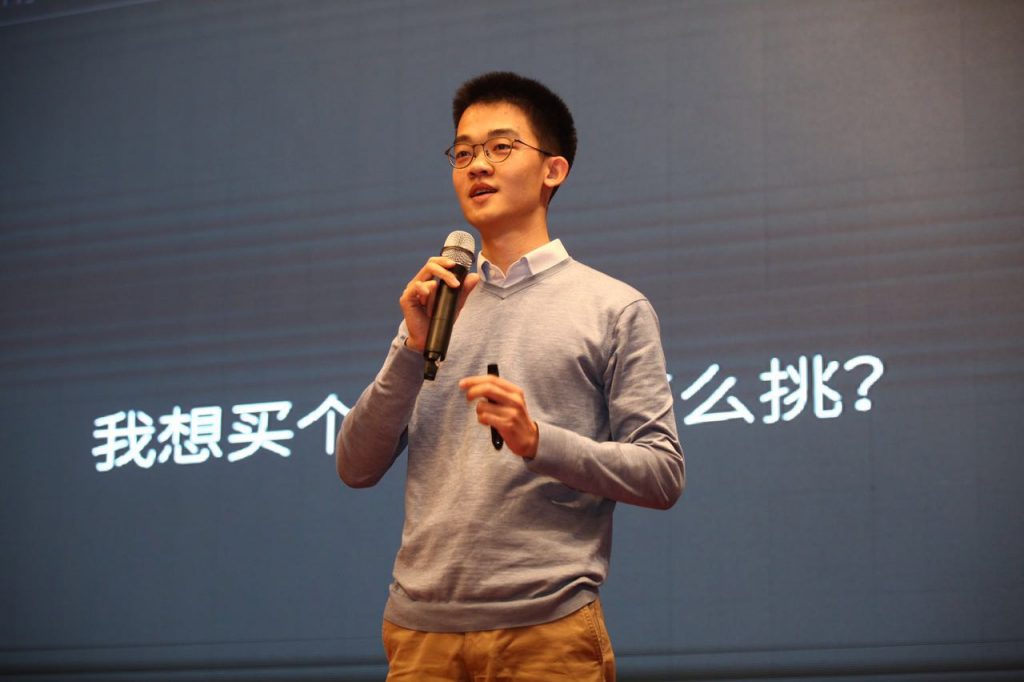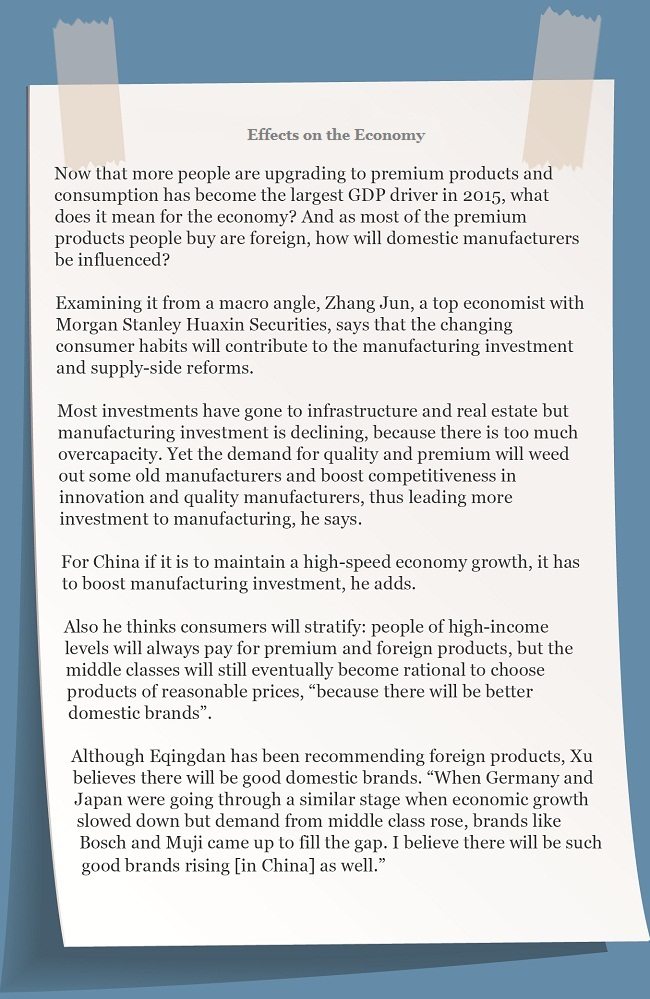
Chinese consumers are hankering after the good things in life—and there is a marked shift in consumption from the mass to premium segments in several categories.
Here’s a question for you: just how much time do you spend choosing and buying a dustbin? Chances are, not a lot. Second question: and how much money would you pay for a bin? Again, not a lot.
But for Patrick Li, a 29-year-old civil servant in Beijing, buying a dustbin for his kitchen was a huge decision. For days on and end, he read up on various kinds of dustbins online. He endlessly researched the pros and cons of plastic dustbins versus metal ones, those with a lid versus those without, etc.
Then he found one with a ‘motion-control whisper lid’—in simple words, a lid that did not clang when shut. It didn’t come cheap: the German-made Brabantia Retro sported a neat price tag of RMB 1,200. Li loved it, but thought it was a tad too expensive.
Two days later he changed his mind when he read an article by a famous home designer on Weibo which emphasized just how important it is to choose a nice dustbin. “The host’s taste can be seen through a dustbin…. A good pedal bin should be well-designed, quiet when the lid closes, and it should be in sync with the style of your home.”
Coincidently at the same time, a friend of Li’s posted something on WeChat: “Anyone with an eye for detail won’t think that a dustbin is a trivial thing.”
Two weeks later, Li turned once again to Taobao, the e-commerce site where Chinese netizens love to do their shopping. He found a bin similar to the Brabantia Retro model he liked, albeit it was much cheaper at RMB 850. By now he had already lost interest in dustbins under RMB 100. Without thinking twice, Li clicked on the ‘buy’ button.
Li is part of a phenomenon that is sweeping across large swathes of China: people are increasingly shifting their consumption of even routine everyday things to more premium categories. “Once people learn about good things, they can’t get over them easily,” says Xu Ke, 27,founder and CEO of Eqingdan (literally translated as ‘the list’), a Beijing-based start-up that offers shopping guides that end up showing the likes of Li more sophisticated offerings for things that they are looking to buy.
Eqingdan, for instance, recently published an article introducing Vipp Pedal Bin priced at RMB 2,000. Among other things, the article talks of the advantages of the Denmark-made bin, the fact that it was displayed as an art object at New York’s Museum of Modern Art and other stories associated with the brand.
“We are not encouraging people to buy such an expensive bin, but we would like to show readers what a dustbin with really good quality looks like,” says Xu.

Trading Up
Li’s parents are flummoxed. They can’t understand why anyone would buy a dustbin that costs more than RMB100, let alone RMB 850. Neither can they understand the deep sense of satisfaction their son feels after buying, of all things, a dustbin. People of their generation never splurged on anything, let alone mundane everyday things.
Li’s generation is different. He is part of the growing tribe of millions of Chinese customers, who have been exposed to a variety of products and are now gradually climbing the consumption ladder and shifting from mass products to premium ones. According to a 2016 McKinsey China consumer report, despite slower-than-expected GDP growth, over 55% of people think their household income will grow significantly. Consequently, they have no qualms splurging.
“The days of broad-based market growth are coming to an end as consumers become more selective about where they spend their money. Spending is shifting from products to services, and from mass to premium segments,” the report says.
“With increasing incomes, Chinese now have the basics, they are more emotional, thinking more about aspirational things and thus the discretional spending number is going through the roof,” says Jeffrey Towson, a professor at Peking University Guanghua Management School and author of The One Hour China Consumer Book.
Chinese consumers are hard to generalize now. The value-focused consumers were 80%-90% of the population (then the mainstream) around 2011, but by 2012, 50% of the citizens became the “new mainstream” who prefer premium, he says. “And then everybody buys luxury products, it just happens sporadically and is evolving quickly.”
The buying decisions of Chinese consumers are often influenced by their own experiences or those of their peers.
Some, of course, get exposed to new trends when they travel abroad or watch foreign films. Others turn to social media. China has 413 million online buyers and according to McKinsey, 55% of them use social media to do product research and get recommendations.
But increasingly now there are a whole host of services that are geared towards exposing Chinese people to newer things. Some like Eqingdan and Caixin Enjoy are essentially shopping guides. Others like Xiaohongshu and Meilishuo fall into a category that can be best described as ‘social commerce’, essentially the combination of social media and e-commerce. Then there are people as well—such as celebrities and social media influencers—who are often paid by companies to endorse brands in a subtle manner. Together, they have helped consumers discover more premium goods.
Let Me Show You What to Buy!
By telling people what products are worth purchasing and explaining why, Xu’s Eqingdan has garnered over 350,000 followers since its founding in 2015, most followers being female between the ages of 18 and 35 from first-tier cities in China.
Eqingdan’s major platforms are its app and public account on WeChat. They are updated every day with new product recommendations. There are also household utility-related articles on themes like ‘how to choose a good juicer’, ‘what you need to do to take care of your leather furniture’ and ‘comparison of different rice cookers’.
Xu’s team sets strict standards for products that qualify to feature on Eqingdan: sleek looks, precision, durability, stability and safety. If someone really wants to be a rational and clever shopper, these are the criteria to consider, he says.
“In China, an oven meets the national standard if its temperature deviation can be controlled within 20 degrees, but there is the German-made Miele oven (price ranges from $2,000 to $13,000) in which the deviation can be controlled within one degree. That’s precision”.
He says Eqingdan provides content aimed at eliminating information asymmetry, telling people what they should know to make the right choice as well as how and where to buy, mostly by giving links to Taobao or other e-commerce sites.
While Eqingdan provides detailed analysis to help people choose quality goods, Caixin Enjoy, a tech company providing shopping tips, is trying to push people to the next frontier of vanity consumption.
For consumers to desire a product, quality is the basic criteria, says Zhao Ji, CEO of Caixin Enjoy. According to Zhao, people today need something intangible, like distinct brand values, to help the buyer stand apart from the rest and even appear to be high-class,
It provides content of interest to men—such as, information on suits, watches and wine. “Today’s young people, especially those born after 1990, care more for how the product will help to define and differentiate them.”
From Zhao’s experience, there can be many different types of articles to recommend a product, but the type that works best always cuts in from an analytical attitude, mixing in human philosophy—the “chicken soup for the soul” type of articles.
That’s why Caixin Enjoy, with over 75% male users, from not only tier-1 cities, but also small towns, provides a variety of content: shopping tips, brand knowledge, etiquette and stories that make a product appear more premium.
The pressure of buying more premium products exists for sure, he says, adding that there is no way an individual can resist the constant streaming of catchy advertisements everywhere. Around 4% of its users end up buying the products it recommends.
Both Caixin Enjoy and Eqingdan profit from advertising revenue. Unlike many start-ups dependent on venture capital, Zhao says, “we manage well without any investment.” Caixin Enjoy advertisers include big brands like Omega, Cartier and IWC.
With over 350,000 users, Eqingdan attracts at least 400,000 views per article. Currently it gets advertising revenue of around RMB 200,000 a month.
Xiaohongshu, one of the largest social-commerce platforms where people read each other’s recommendations, is a community where people, mostly female ranging from 18 to 35, read about the good things owned by others.
With over 15 million users and a valuation of RMB 1 billion, it links the social community with e-commerce. It mainly sells foreign products and has a conversion rate of between 8% and 20%—which is considered the highest rate that can be reached in this industry and its sales revenue in the second half of 2015 stood at RMB 700 million.
Ricky, 27, an editor at a lifestyle magazine in Beijing, says she spent more on shoes after she opened an account on Xiaohongshu, because she discovered new objects every day and ended up buying them after reading recommendations by others.
She followed a popular netizen Liu Shishi, who has over 38,000 followers on Xiaohongshu. One of Liu’s posts with 3,000 likes is a photo of all the 15 pairs of shoes she has, price ranging from RMB 1,000 to RMB 8,000. In the post she explains where and why she bought each of them and which one was more comfortable. She also encouraged others to get them to “match the clothes in your closet.”
Last winter, Ricky bought a pair of Stuart Weitzman boots for $700. Her desire for this pair was fueled by Xiaohongshu users who posted pictures of it. Ricky feels a sense of achievement ever since. “Shoes are worth the investment,” she says, quoting the popular saying, “Once you have a good pair of shoes, everything you wear will look better.”
Zhai Fang, founder of Xiaohongshu, told the 21st Century Business Herald that her goal is to let every user to become someone who could stimulate other people’s shopping desires. As if on cue, Ricky herself has begun to post photos of things she buys and peppers her recommendations with phrases like “you deserve better”.
Ricky not only follows pioneering buyers on Xiaohongshu, but she also follows a lot of celebrities on Weibo and WeChat. In fact, in the last two years, most celebrities she follows have gone commercial: they have either becoming brand endorsers themselves, or have opened their own shops.
Compared to the shopping guides, online celebrities take a more personal approach when exhorting people to buy certain products. Data from Alibaba shows that in the last Single’s Day shopping carnival, six of the best-selling women clothing shops were owned by such celebrities.
Chen Nuanyang, 27, gathered over 700,000 followers because of her workout videos and fitness tips. A fan commented on one of her videos on Weibo, saying that Chen is a good sports model who “communicates like a friend”. Chen doesn’t publish for no reason: she promotes her own brand in her videos. Her shop on Taobao has over 1,060,000 fans and her bestsellers are T-shirts and shorts which sell over 4,000 pieces monthly.
Companies often hire celebrities and internet icons to endorse their brands. They often post pictures of themselves online describing which parts of their ensemble belong to which brand and people who want to emulate them, rush to buy.
A popular blogger Cheng Yan, who has over 1 million fans on her public WeChat account ‘Shiliupo baogao’ (‘The report of the pomegranate grandma’), attracts readers with the latest gossip of film stars, mostly Hollywood celebrities, and what they wear and use. Given her huge influence on readers, she currently charges RMB 100,000 for one commercial advertisement on her WeChat public account.
Lucile Yang, a senior investor at Bertelsmann Asia Investments, which has invested in many shopping guide start-ups, says that these shopping guide companies as well as individuals are successful because they provide content in sync with current social values.
“Wherever there is good content, there will be consumers,” she says.
All said and done, these sites have their limitations as well. For one, the consumer can be skeptical. Although most of the content on Eqingdan and Caixin Enjoy is not paid for and they mark advertisements clearly, Towson has his doubts: people can be skeptical and take their recommendations as advertisements. He feels that “word of mouth” by acquaintances works better for Chinese compared to other consumers.
These sites could also urge consumers to behave irrationally. After reading the recommendations, they may discover things they had never heard of or desired before, but the desire is stoked, unnecessarily burdening their shopping lists and their wallets.
Eqingdan’s Xu gives the example of a $400 food waste pulper by InSinkErator, a company based in US. “Once I tell you of the existence of this gadget that can process all your kitchen waste during cooking, you will want to have it.”
Now that the dustbin is taken care of, maybe Li should invest in the InSinkErator next.




















